- Home
- Iain Rob Wright
The Peeling Trilogy Page 3
The Peeling Trilogy Read online
Page 3
“What are you going to do?” he asked her.
“I’m going to finish up tonight and then go home. I’m finished after tonight.”
“You’re quitting?”
“Not exactly.”
“What then?”
Sarah took in a deep breath and let it out slowly through her slender nose. She stared at Jeremy for a moment, then put her left hand to her right sleeve. She rolled up her cuff and exposed her wrist.”
Jeremy shook his head in disgust. “No. You can’t have it!”
The wound on her arm was puckered and wet, the skin gone, exposing the flesh of the muscle beneath. A tangy odour filled the room like spoiled bananas.
“I’ve been hiding a cold the last couple days, but I didn’t know I had it for sure until this morning. Noticed it in the shower. It’s already spread twice as much since then.”
Jeremy rubbed both hands down his face and imagined the skin peeling off beneath his fingernails. He was one of the lucky ones, so far; the right side of the 50/50. “You’re sure there’re absolutely no survivors? There’s nothing the NHS can do?”
Sarah shook her head and actually seemed somewhat resigned to her fate. Maybe she felt luckier to be one of the infected than one of the healthy – least for them the nightmare had an end. “I’m already dead,” she said. “I don’t know if I’m infectious, but I don’t want to take the risk anymore. I’m going home tonight and staying there. It’s where I’d rather be, anyway.”
“I’m sorry,” Jeremy told her, and he truly meant it. “I…wish there was something I could do or say.”
Sarah rolled her sleeve back down, covering her wound. “I’m just glad you don’t have it as well. As long as some of us get through this then I guess things aren’t completely doomed.”
“My wife has it. She came down with it three days ago now.”
Sarah put her hand on his shoulder and squeezed. “Then I’m sorry too. You should go home and take care of her.”
Jeremy glanced at his watch. “My shift isn’t-”
“It doesn’t matter. I don’t think anything really matters anymore. This is just the calm before the storm. Things are about to fall to pieces and the only thing we can do is look after the people we love. Go home, Jeremy. Look after your wife.”
Jeremy watched Sarah return to the studio and knew that it would be the last time he ever saw her in person again. He hoped her passing would be peaceful, but that was a luxury the peeling gave to no one. She would feel pain beyond anything she had previously imagined, and then she’d die – adding to the statistics that she’d been reporting for the last week.
It was time to go home. Sarah had been right about nothing mattering anymore. If those people in the studio wanted to start fights then let them. Jeremy wasn’t about to waste another minute watching over a bunch of unruly strangers turn on each other. The news studio was on the second floor so he had to take the stairs downwards to reach the building’s exit. The reception area was empty, its staff all sick and dying at home. Jeremy knew most of them, but not well enough to grieve them. He headed for the heavy glass doors that led outside to the parking lot.
Outside were several vehicles belonging to the people inside. Sarah’s Jeep Cherokee was parked next to Tom’s more audacious Jaguar, and beyond them both was Jeremy’s Ford Focus. He took out his keys as he headed over, and pressed the fob. The car’s lights flashed twice and the doors were unlocked. He opened the driver’s side and slid behind the wheel.
Turning the ignition, Jeremy started the engine. The needle on the fuel gauge headed towards empty and stopped a little ways off. He laughed. Some things would never change, no matter what happened to the world; cars would always run out of fuel, and fuel would always cost a bomb (especially now that the military had commandeered it all).
The military were everywhere now, as were the police. It was to be expected, Jeremy supposed, but it was still disconcerting to watch olive green, 3-tonne trucks patrolling every main road. With the UK’s history of riots, the Government were taking no chances. There was even a sentry posted at the news station’s car park, controlling the bright-red automatic barrier instead of the usual civilians that had done so before. Jeremy pulled the car into gear and drove towards that barrier. The armed soldier, there, stepped up beside the car as it approached. Jeremy lowered the electric window and leant out with his security ID. It wasn’t his usual station ID, but a new state-issued ID that allowed him to leave his home and travel to work. They called it a Vital Services Identity Card – pronounced V-SIC. It was a privilege to have one in many ways, but a burden too. Being outside was a constant danger for many reasons (number one being exposure to the peeling). Still, if Jeremy was going to come down with the sickness, he surely would have had it by now.
“Everything okay in there?” the soldier asked him, motioning to the building with his head.
“There was a bit of trouble earlier. People are getting scared. Might be a good idea to post a man inside.”
“No can do,” said the soldier. “Orders are to remain outside at all times, unless absolutely necessary.”
Jeremy understood and nodded. “Can’t have people thinking that the military are controlling the press.” Even though they are, thought Jeremy.
The soldier gave no reaction, his expression implacable. “Drive safely, sir. Go straight home.”
Jeremy nodded and moved the car slowly forward as the metal barrier rose in front of him. Once past it, he pulled into third-gear and increased his speed. It was easy to drive fast, because the roads were empty. Travel was restricted, to prevent the spread of infection, and only certain vehicles were allowed on the road at all. Jeremy’s Ford Focus qualified and had a luminous green circle on both the front and back. It told any passing military that he was allowed to use the roads, and for the most part they left him alone. In fact, a convoy of trucks was heading toward him right now and seemed unconcerned by his presence on the highway. The driver of the lead truck nodded to him as they passed, and it was only a few moments before he was the only car on the road again, driving along the withered husk of the nation’s once-heaving infrastructure. He lived almost forty-miles away from the news station, but with the roads wide open, he would get there in thirty minutes.
He turned on the radio, but quickly switched to CD mode. The last thing he wanted was more news – or uninformed hypotheses masquerading as news. The sound of Blue Oyster Cult’s Don’t Fear The Reaper came on from a mix-disc he’d filled full of rock songs. It seemed pretty apt for the mood he was in and he let it play to its conclusion.
***
After taking the dual-carriageway most of the way home, Jeremy took a slip road into Stratford. As he crossed over the bridge into the centre of town, he could see that the police were patrolling the River Avon in modified barges. Every single day, the police and military presence seemed to increase, and it now seemed that Britain’s waterways were just as restricted as its roads.
Much of the routes through town were cordoned off, and Jeremy was forced to manoeuvre his car along the riverbank, passing in front of the Globe theatre. The historic, thatched-roof building lay abandoned and mournful, its function to entertain no longer required. Jeremy suddenly regretted never having been inside before to experience the lively works of Shakespeare. There would probably be a lot of things he’d never experience now.
Something flew out from behind the theatre and stumbled into the road. Jeremy hit the brakes.
Standing in the centre of the narrow side-street was a peeler – a victim of the plague. Whether it was woman or a man was unclear now, but the long, matted hair suggested the former. Jeremy gawped in horror as the figure approached with the shambling gait of a zombie. But this thing – this human being – was worse than a zombie. This thing was living agony, walking towards Jeremy like a nightmare made flesh. It was the worst case of the infection that Jeremy had yet seen. The woman had not a single inch of skin left intact, her muscle – and even bone – expose
d from head to feet. Eyeballs bulged from her glistening skull like gelatinous orbs of pus; they focused on Jeremy.
The woman staggered towards him, her bleeding arms stretched out pleadingly. She made no sound, perhaps incapable of doing so. Behind her was a trail of viscous fluids and spoiled meat. It was a miracle the woman was even still alive, let alone able to walk.
Jeremy put the car into reverse, preparing to flee. He could not help this person, they were already dead. Even if a cure was found, this woman was beyond the point of salvation. “I’m sorry,” he said out loud, then lifted up the clutch. The car began rolling back, away from the woman.
She followed after him for a few more steps, seeming to lose more flesh and blood with every movement. So transfixed was Jeremy on the horrible sight that he almost didn’t see what was in his rear view mirror. He slammed on the brakes again.
Behind him, a military truck blocked the road where he had come from. A single soldier hopped out from the elevated cabin and landed on the cement with his heavy jackboots. The man had a scruffy beard and his sleeves rolled up past the elbows. The standards of appearance for the British Army had obviously been forgotten in the last week. It was hardly surprising.
The infected woman was still coming closer, still reaching out her arms. The soldier moved in front of Jeremy’s car and faced down the woman. He pulled out his sidearm, a mean-looking pistol, and pointed it forward casually. Then he let off a shot. A single bullet did the job, hitting the woman in her cheek and passing through her skull. Gore and grey matter painted the road, adding to the mess that was already there.
Jeremy’s breath caught in his throat and he could actually feel his heart beating against his chest. He was not used to the sight of guns, period, and he’d never before seen one used to kill another human being. Numbness washed over him that was probably the beginnings of shock.
The soldier holstered his weapon and marched over to Jeremy’s window. Jeremy unwound it and quickly grabbed his ID card from where it lay on the dashboard. His hands were shaking.
“Thank you, sir. Everything seems to be in order. Are you on your way home?”
Jeremy stared out at the dead woman on the road and found himself unable to blink.
“Sir?”
“Huh? Oh, yes. I’m going straight home now.”
The soldier seemed to notice Jeremy’s concern and knelt down to match his eyelevel. “It was for the best, sir. Like putting down a sick dog.”
“A…a dog?”
“It may seem cruel, but when the infection gets that bad, it’s kinder to just end it. A lot of them have started to lose their minds now – who can blame them – but they’re becoming dangerous. If you see any more of them I advise you keep on going as fast as you can.”
Jeremy swallowed. The soldier spoke about the infected like they were things not people, but was that really so surprising? Anyone with the peeling was insane with agony and doomed to die – had any humanity still existed inside the woman now dead in the road?
“You go on now, sir? Get moving.”
Jeremy pulled the car back into first and headed forward, steering around the mutilated corpse of the woman. The soldier remained standing in the road and watched until he was out of sight.
***
Stratford had become a military outpost like many other small towns with open areas. Further downriver, the waters teemed with gunboats, and the roads led to checkpoints in all directions. Cars and houses lay abandoned, while large fires fumed in many open areas. Jeremy had a morbid realisation that the soldiers were building pyres and stacking them with the bodies of infected. The movement amongst the flames made it clear that not all the bodies were dead.
What the hell was happening? In only the nine or ten hours since Jeremy had travelled to work, things had deteriorated to frightening levels. A police state was in effect and sick people were being quarantined or burned alive. Even the healthy were being caged inside their homes without compassion. Jeremy turned a corner, heading away from town, and saw a squad of Royal Fusiliers boarding up a house while frightened people tried to escape through the windows. A small boy actually managed to get free of the house and made a run for it down the road. A moment later the boy was dead, a rifle round between his shoulder blades. Jeremy couldn’t even tell if he’d been infected.
Jeremy thought about his wife. Would he return home to find that she had been rounded up too? Rotted away and thrown on a fire? The thought made his foot stamp down harder on the accelerator. Once he was home he would stay there, until the very end, until it was over. What he would do then, he did not know. His life would go on whilst his wife’s would end. In many ways he envied her. The world going on around him was not one he wanted to be a part of anymore. In less than twenty-four hours things had gotten so bad that he dreaded to think about what just one more day would bring.
***
The military presence reduced as he left the town centre and headed into the residential areas. By the time he reached his house, it had been almost ten minutes without seeing another soul, other than stray dogs and feral cats. His home was dark, the windows shaded by closed curtains. The light had started to hurt his wife’s eyes and the lamps had all been left off since the night before. Her condition had been in the early stages then; he worried what she would be like now. The virus worked fast, a destructive force akin to an invading army. The body’s skin and muscle cells got obliterated, one by one, helplessly succumbing to infection until they were nothing more than soup.
Jeremy parked the car up on the curb and turned off the engine. He stepped out and pressed the key fob, locking the car. Then he started up his path and headed for his front door. Before he got there, though, it opened from the other side.
“Hey, honey. I’ve been waiting for you to get home. It’s been lonely without you.”
Kara hopped off of the doorstep and took Jeremy by surprise, planting a kiss on his mouth, and slipping in her tongue. He pushed her away.
“What’s wrong?” she asked.
“Everything,” he said, stepping through into the house while she followed. “Have you looked outside the window lately?”
“No. I don’t want to know what’s going on out there. It’s too frightening. Is it bad?”
Jeremy stared at her. “You have no idea.”
Kara approached him and put her arms around his shoulder and planted another kiss on his cheek. “Well, as long as we still have each other.”
Jeremy pushed her away again and sighed. “Kara, what are you doing here? Where’s your sister?”
“In bed. She wasn’t feeling good, so she went to sleep.”
Jeremy thought about his wife, alone upstairs, suffering. He felt outraged at Kara. Did she not care? It was her sister, for Christ’s sake. He took a deep breath and fought to remain calm. “How is she?” he asked. “Is it bad?”
“What do you think? Hasn’t that news station of yours found a cure yet?”
Jeremy huffed. “They’re journalists, not doctors. And to answer your question, no. There is no cure. It’s killing everyone who has it.”
Kara slumped down on the sofa and finally seemed to get a little more serious as concern etched itself across her face. Perhaps she did care about her sister after all. “There’s really nothing anyone can do?” she asked.
Jeremy shook his head. “That’s why we need to look after your sister – my wife. Carol needs our love and support. We can’t fool around behind her back anymore. I’m done behaving like that.”
Kara did not reply. She stared at the blank television screen as though the glass were a portal to something more interesting. Jeremy didn’t care to console her. He’d had enough of his wife’s younger sister. Once Carol passed on, she could leave, go back to her own place, and they should never speak again. If he was honest with himself, his wife was the only woman he had ever truly loved, and once she was gone, he was giving up women for good.
Jeremy didn’t want to waste any more time. The value
of a second had increased exponentially since the peeling found its first victim – whoever that may have been. He placed his foot on the first step of the staircase and looked up. The second floor seemed like miles away; another world, filled with horrors and regret. He began to climb, dreading what he would find upstairs. What pain would Carol be in? Would she cry out when he entered, or would she remain silent like the woman gunned down in the road? He was about to find out.
Reaching the top of the stairs, Jeremy headed across the landing to the master bedroom. He placed an ear against the door and listened. Silence. Without even realising it, his hand had gone to the handle and begun to turn it. A moment later, his legs carried him through into the bedroom.
Carol was asleep in their double bed, the duvet kicked down to the bottom of the mattress. She was hot, the heat of her fever filling the room with a sweaty aroma. Her body was pale and smooth, but still healthy. Her face however…
Jesus Christ!
…her face was little more than a sinewy skull. Her jaw and teeth were utterly exposed, making it seem like she was grinning constantly. Her cheeks had worn away, leaving her eyeballs sunken beneath the thin, translucent scraps of her eyelids. Beautiful brunette hair lay disembodied on the pillow, no longer attached to her head. She looked like a corpse. Yet she breathed.
“Sweetheart?” Jeremy approached cautiously, not wanting to startle her. If she was in pain, then it was probably cruel of him to bother her at all. But he needed to talk to her. It was time to confess his sins.
Slowly, the tissue-like skin of her eyelids rose. Beneath them, his wife’s eyes were as they’d always been: green and sparkly – full of life.

 Dark Ride
Dark Ride Gripping Thrillers
Gripping Thrillers Hell on Earth Trilogy: The Complete Apocalyptic Saga
Hell on Earth Trilogy: The Complete Apocalyptic Saga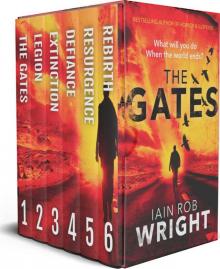 Hell on Earth- the Complete Series Box Set
Hell on Earth- the Complete Series Box Set Witch: A Horror Novel (The Cursed Manuscripts)
Witch: A Horror Novel (The Cursed Manuscripts)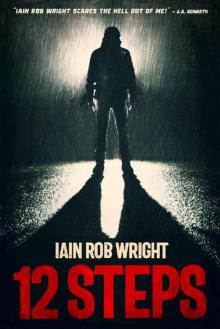 12 Steps
12 Steps A is for Antichrist
A is for Antichrist Blood on the Bar
Blood on the Bar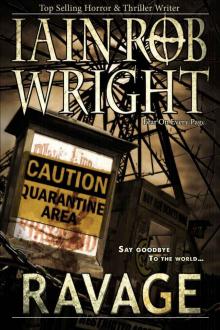 Ravage: An Apocalyptic Horror Novel
Ravage: An Apocalyptic Horror Novel Terminal (Major Crimes Unit Book 4)
Terminal (Major Crimes Unit Book 4) Wings of Sorrow (A horror fantasy novel)
Wings of Sorrow (A horror fantasy novel) Blood on the Bar (Lucas the Atoner Book 1)
Blood on the Bar (Lucas the Atoner Book 1)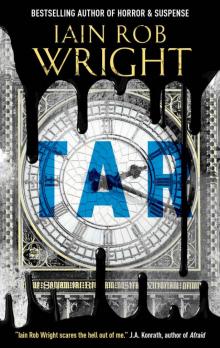 Tar: An apocalyptic horror novella
Tar: An apocalyptic horror novella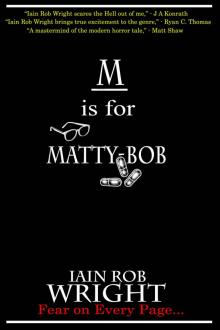 M is for Matty-Bob (A-Z of Horror Book 13)
M is for Matty-Bob (A-Z of Horror Book 13) Animal Kingdom
Animal Kingdom Animal Kingdom: An Apocalyptic Horror Novel
Animal Kingdom: An Apocalyptic Horror Novel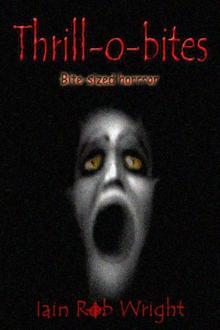 Thrillobytes: bite-sized horror
Thrillobytes: bite-sized horror ASBO: A Thriller Novel
ASBO: A Thriller Novel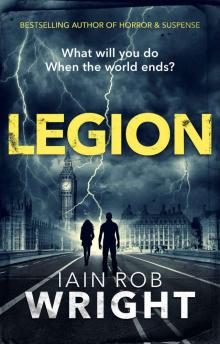 Legion: An Apocalyptic Horror Novel (Hell on Earth Book 2)
Legion: An Apocalyptic Horror Novel (Hell on Earth Book 2) J is for Jaws (A-Z of Horror Book 10)
J is for Jaws (A-Z of Horror Book 10)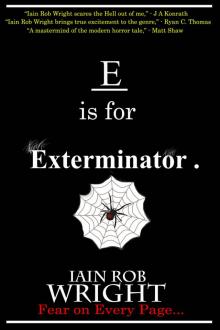 E is for Exterminator (A-Z of Horror Book 5)
E is for Exterminator (A-Z of Horror Book 5) The Gates: An Apocalyptic Novel
The Gates: An Apocalyptic Novel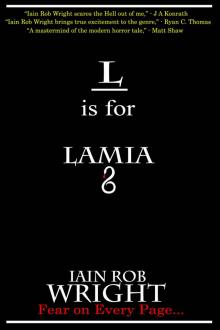 L is for Lamia (A-Z of Horror Book 12)
L is for Lamia (A-Z of Horror Book 12) B is for Bogeywoman (A-Z of Horror Book 2)
B is for Bogeywoman (A-Z of Horror Book 2)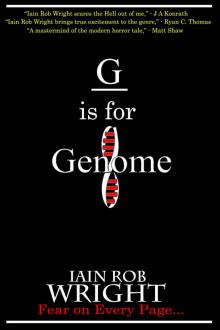 G is for Genome (A-Z of Horror Book 7)
G is for Genome (A-Z of Horror Book 7) The BIG Horror Pack 2
The BIG Horror Pack 2 The Final Winter: An Apocalyptic Horror Novel
The Final Winter: An Apocalyptic Horror Novel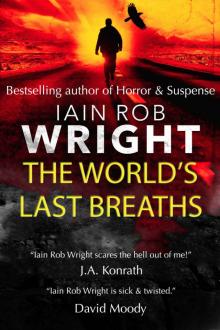 The World's Last Breaths: Final Winter, Animal Kingdom, and The Peeling
The World's Last Breaths: Final Winter, Animal Kingdom, and The Peeling C is for Clown (A-Z of Horror Book 3)
C is for Clown (A-Z of Horror Book 3)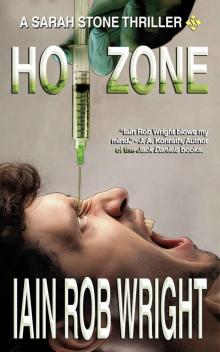 Hot Zone (Major Crimes Unit Book 2)
Hot Zone (Major Crimes Unit Book 2)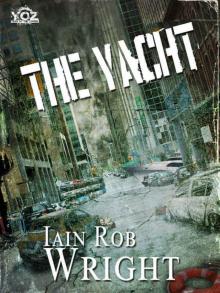 The Yacht (Year of the Zombie Book 3)
The Yacht (Year of the Zombie Book 3) Slasher: the Escape of Richard Heinz
Slasher: the Escape of Richard Heinz I is for Ice (A-Z of Horror Book 9)
I is for Ice (A-Z of Horror Book 9)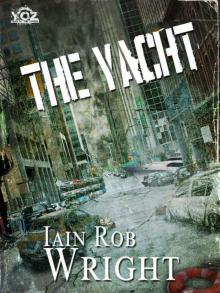 Year of the Zombie (Book 3): The Yacht
Year of the Zombie (Book 3): The Yacht The BIG Horror Pack 1
The BIG Horror Pack 1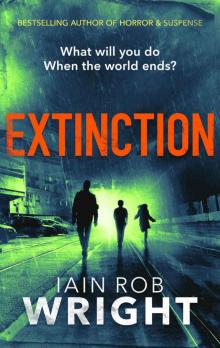 Extinction: An Apocalyptic Horror Novel (Hell on Earth Book 3)
Extinction: An Apocalyptic Horror Novel (Hell on Earth Book 3) Sea Sick: A Horror Novel
Sea Sick: A Horror Novel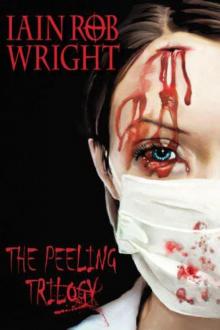 The Peeling Trilogy
The Peeling Trilogy The Housemates: A Novel of Extreme Terror
The Housemates: A Novel of Extreme Terror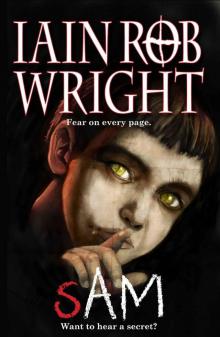 Sam
Sam